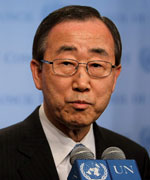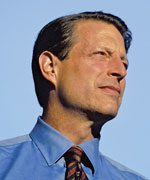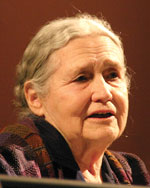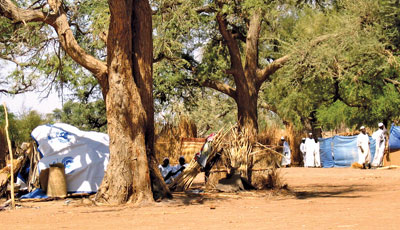What did 2007 bring?
Dr. Ruwantissa Abeyratne
|

Ban Ki-moon
|

Al Gore
|

Doris Lessing
|
In 2007, as in other years, the heavens did not disappoint us. Four
eclipses took place, visible from different places on Earth.
First was a total eclipse of the Moon on the night of March 3-4,
which was best visible from Europe or Africa. Eastern North America saw
some of the spectacular phenomenon.
The second eclipse was on August 28th, when another total lunar
eclipse was visible from all Pacific Rim countries, including most of
the United States and Canada.
Both of these lunar eclipses were followed, two weeks later,
respectively by partial solar eclipses. The March 19th eclipse was be
seen from China, and that of September 11th from southern South America.
Astronomers and other sky watchers along the West Coast of North
America were treated to a view of an extremely young crescent Moon on
April 17th. The following month there was a new debate about what
constituted a Blue Moon. For Americans, the Moon became full twice in
May (on the 2nd and 31st)and for Europeans, it did so twice in June (on
the 1st and 30th).
Saturn led the parade of the major planets in 2007. In January this
ringed planet was a magnificent sight in telescopes, visible all night
every night, and it stayed high in the evening sky for another four
months.
Venus played the role of the brilliant evening star throughout July,
passing through its stunning crescent phase, and in late August it
entered the morning sky.
Mercury made its best evening appearance at the end of May for
Northern Hemisphere observers, and again in the morning sky during the
first half of November. Mars grew in size to become a fine telescopic
sight in December, its disk hovering between 15 and 16 arc seconds
across all month.
The Betrayal
Down here on Earth we did not fare that well. In many contexts 2007
was one of denial where key issues affecting humanity were largely
ignored by the world community. Yet it brought some sense of acceptance
of basic facts of compelling reality. The betrayal of the year was when
we looked the other way from human conflict and suffering.
For instance, infighting in Somalia, which the Time Magazine calls “
the other Darfur” forced over one million civilians to flee from their
abodes and be refugees in safer places. Time reports the U.N ambassador
to Somalia as having acknowledged that there is a major crisis in the
country which was being ignored.
In another part of the world, in Rangoon, there was a brutal military
crackdown on thousands of peaceful marchers including saffron robe-clad
Bhikkus who demonstrated on September 24 against the current oppressive
rule which they wanted replaced by true democracy.
Except for some rhetoric, the powerful outside world stood by.
Myanmar is a closed society which neither listens to nor embraces the
changes happening outside, thus making its citizens isolated and
destitute of support.
Again, in another part of the world, there are 750,000 Iraqi refugees
in Jordan and 1.5 million in Syria. Of the displaced Iraqis, fewer than
30,000 returned to their homes in Iraq in 2007.
|

Refugee camp in Dafur |
Although the number of sectarian killings is far reduced, arguably
because of the injection of additional troops to combat the menacing and
ominous insurgency, there is a long way to go.
However, the fact that the violence has paused to catch its breath in
places such as Falluja, does not mean that a lull or absence of war for
the time being can be assumed to turn into real peace.
The war in Afghanistan, which commenced in October 2001, has
accounted for many civilian casualties, many of which occurred in 2007.
In Somalia, the atrocities that occurred in 1993 re-emerged in 2007
but whereas in 1993 the bodies of American soldiers were dragged through
the streets of Mogadishu, in 2007, the bodies of Ethiopians were dragged
and paraded before cameras and in front of the public, in November.
Human Rights Watch has called upon the United Nations Security
Council to urgently press the Ethiopian and Somali governments to end
the grave human rights abuses that are fuelling the worsening
humanitarian crisis in Somalia and eastern Ethiopia’s Ogaden region.
Steve Crawshaw, UN advocacy director at Human Rights Watch, is
reported to have said that the humanitarian suffering the world sees in
Somalia and Ethiopia’s Somali region is the direct result of serious
international crimes.
He has further said that concerned governments and the UN Security
Council need to press Ethiopia and Somalia to end the abuses and ensure
accountability for their armed forces.
The entire region covering the horn of Africa is in a state of chaos,
where Somalia has an acute humanitarian crisis and Ethiopia and Eritrea,
the latter which seceded in 1993 from the former, are at the brink of
war.
In what is alarmingly reminiscent of the border conflict between the
two States a decade ago which claimed 700,000 lives, both countries
amassed in 2007, 100,000 troops at their borders, ready to go to war to
settle the dispute over their territories.
In human development, although some progress was made in medical
sciences in 2007, it is not considered sufficient.
General Health News of 26 December 2007 reports that further efforts
are needed to improve the health and wellbeing of indigenous peoples in
developed countries all over the world, according to a report published
in the online open access journal, BMC International Health and Human
Rights.
The study points to a worrying lack of progress for the Australian
indigenous population during the 1990s.
In another area of human rights, the world, in its increasing
accommodation of globalisation and the blurring of boundaries, became
increasingly mindless of the migrant domestic worker. Millions of
migrants work as domestic workers-most of them women and girls.
Rather than receiving the respect due them and a proper recognition
of the critical role they play in supporting families and providing care
for the young and elderly, such workers were met with disregard and, too
often, neglect and abuse.
Some governments forgot that they gain, not lose by protecting the
rights of migrant workers, and the development of their economies as
well as the economies of nations where such workers come from depend on
the labour of these workers.
United Nations Secretary General Ban Ki-moon, a man of great
statesmanship, experience and humanity took over the helm of that great
Organisation in 2007 with a principled agenda on human rights, taking
the reigns from another exemplary and proactive leader, Kofi Annan.
This was indeed encouraging provided the Secretary General received
the support of the international community to which his Organisation is
accredited. He assumed the post of Secretary General at a pivotal moment
for human rights within the UN system.
It is reported that the key pieces of Annan’s human rights legacy-the
Human Rights Council and the “responsibility to protect” doctrine-are
not just incomplete, but endangered.
Peggy Hicks, in an article entitled : “ Principled Leadership: A
Human Rights Agenda for UN Secretary-General Ban Ki-moon”, claims that
the Human Rights Council has failed to take action to address the
world’s human rights crises, and has adopted a one-sided approach to
abuses in Israel and Lebanon.
Hicks goes on to say that States with poor human rights records have
dominated the council’s deliberations, and supporters of human rights
have failed to exercise leadership to put this new body on course.
Furthermore, the situation in Darfur is deteriorating, exposing the
absence of a mechanism to put the principle of responsibility to protect
into practice. Annan’s efforts to mainstream human rights are also
incomplete: human rights frequently remain a secondary-and often
unwelcome-consideration in the UN’s work.
Hicks continues that, at the same time, given the failure of
governmental leadership, the UN’s role in human rights protection has
never been more important. Of course, there is reason to question
whether the United Nations- which is composed of those same governments
- will be willing to do more than its Members individually.
While these constraints should temper expectations, the United
Nations has shown the ability to do more for human rights than the sum
of its parts, particularly when it has had a committed secretary-general
at the helm.
For example, the Security Council was able to refer the situation in
Darfur to the International Criminal Court, although the United States
(US), Russia, and China were showing signs of being opposed to that
action.
Arguably the greatest betrayal of 2007 affected the most fundamental
human right - the right to life and security. Terrorist attacks
inordinately destroyed hundreds, and perhaps thousands of human lives.
The third September/October 2007 Terrorism Index reflects that, more
than 100 of America’s most respected foreign-policy experts see a world
that is growing more dangerous, a national security strategy in
disrepair, and a war in Iraq that is alarmingly off course.
The Realisation
The encouraging thing about the year was that, along with the sense
of betrayal, the storm of negativity seemed to catch its breath, to
allow a breath of fresh air.
Al Gore won the Nobel Peace Prize, hopefully forever shutting the
mouths of the impulsively inane air heads who claimed that global
warming is the result of the wishful imagination of a group of
charlatans.
The violence in Baghdad cooled off again arguably due to the
injection of more troops in troubled areas, bringing to bear the
realization that terrorism can be controlled if effective measures were
in place.
China retained its dignity and pride as the next host of the Summer
Olympics despite grave accusations of polluting the environment and
infesting the world with toxic toys around the world.
The Nobel Prize in Chemistry was awarded to Gerhard Ertl of Germany
for his studies of chemical processes on solid surfaces.
On October 15, 2007, the Royal Swedish Academy of Sciences, the Bank
of Sweden, and the Nobel Foundation announced the Academy’s award of the
Prize in Economic Sciences to three Americans, Leonid Hurwicz, Eric
Maskin, and Roger Myerson for having laid the foundations of the
Mechanism Design Theory.
Their work has among other things helped economists identify
efficient trading mechanisms, regulation schemes and voting procedures.
The prize for literature went to Doris Lessing, a British citizen cited
as “that epicist of the female experience, who with scepticism, fire and
visionary power has subjected a divided civilization to scrutiny”.
The Nobel Prize in Physics was awarded to Albert Fert of France and
Peter Grunberg of Germany for the discovery of giant magneto resistance.
The 2007 Nobel Prize in Physiology or Medicine was awarded to Mario
Capecchi of Italy, Sir Martin Evans of the United Kingdom and Oliver
Smithies of the United Kingdom and the United States, for their
discoveries for introducing specific gene modifications in mice by the
use of embryonic stem cells.
At the United Nations Conference on Climate Change, hosted by the
Government of Indonesia, which took place at the Bali International
Convention Centre and brought together more than 10,000 participants,
including representatives of over 180 countries together with observers
from intergovernmental and nongovernmental organizations and the media,
participants adopted the Bali roadmap, which charts the course for a new
negotiating process to be concluded by 2009 that will ultimately lead to
a post-2012 international agreement on climate change. Ground-breaking
decisions were taken which form core elements of the roadmap.
They include the launch of the Adaptation Fund as well as decisions
on technology transfer and on reducing emissions from deforestation.
These decisions represent various tracks that are essential to achieving
a secure future for the global climate.
The Bali Conference is considered a breakthrough in human realisation
where Parties have recognised the urgency of action on climate change
and have now provided the political response to what scientists have
been prescribing for the world.
Another global realisation which took flight in 2007 was the value of
people as a resource and investment in people. There was much emphasis
across the world of the overall value of human resources in the work
place.
This realization started off as an initiative of the United Nations
in 2006 where, at its 61st Session of the General Assembly the United
Nations adopted Resolution A/61/255.
This resolution, which approves of a Report of the Secretary General
offering an integrated package proposes fundamental changes that will
bring United Nations human resources management system into line best
practices.
This includes a more proactive, targeted and speedy recruitment
system, an approach to mobility that integrates Headquarters with field
staff, greater career development opportunities, simplifying and
streamlining contractual arrangements and harmonizing conditions of
service - particularly for staff serving in hardship duty stations.
Last year where we took contrived measures to look after our globe.
However, it also reiterated the grim realization that we are continuing
to betray ourselves in areas that matter in the short term.
|

